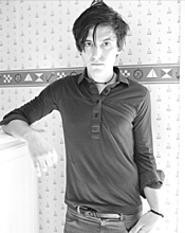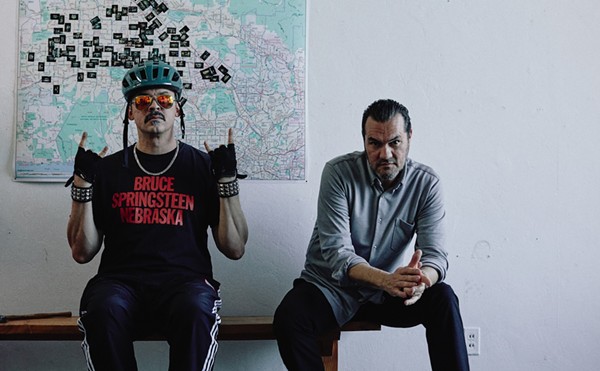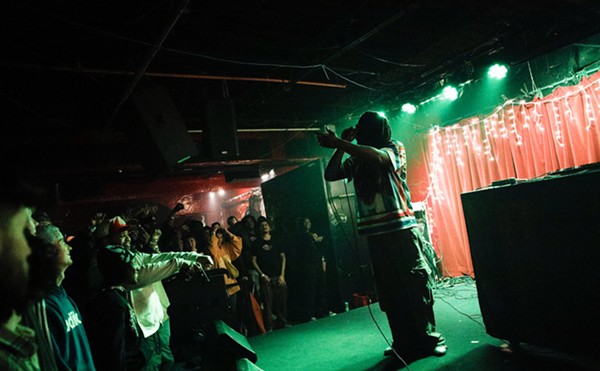Maybe it was the weight of all those glowing press clippings. No 25-year-old has ever suffered so many Bob Dylan comparisons, in every publication from The New Yorker to Rolling Stone. In recent months, all the hype seems to have gone to the young Nebraskan's head. He infamously lashed out at concertgoers in Dallas earlier this year -- saying that if they were normal Texans, they'd be "roping steers and raping Indians" -- and in interviews, he sometimes seems prickly and detached (see "Bright Eyes, Sullen Demeanor," May 12).
So when Oberst and his band Bright Eyes rolled into town last week, it was hard to know what to expect. Would he prove to be another self-absorbed singer-songwriter, castigating the powers that be when not getting all starry-eyed with his own intellect? Or would his anger and resentment feel authentic in the face of so much manufactured, cubic-zirconium dissent peddled by the likes of Good Charlotte and Eminem?
The answer is a bit of both, though Oberst mostly lived up to his billing as an incisive if somewhat precious performer. He did little grandstanding at the Agora, coming off as polite and gracious.
Maybe this was a reflection of the material he was playing. Bright Eyes focused almost solely on Digital Ash in a Digital Urn, the more electronic, less political half of the two albums he recently released simultaneously.
Though it's a fine record in its own right, the disc has suffered in comparison with its more austere and immediately affecting counterpart, I'm Wide Awake, It's Morning. Sure, Urn can seem a bit busy and overstuffed at first, with layers of chimes, Wurlitzer, theremin, and synth battling for space in the mix, like siblings fighting for seconds at the dinner table.
But live, on a big stage with a nine-piece backing band, the songs unfurled slowly and elegantly. Their heft, while sometimes overwhelming on disc, was much better suited to a big concert hall, where the sweeping songs had room to breathe. A pair of giant video screens at the back of the stage projected visuals of mountaintops and panoramic skies worthy of Koyaanisqatsi, highlighting the wide-open feel of the music.
Through it all, Oberst was careful not to interrupt the mood with too much banter. He didn't even seem to get irritated at all the catcalls for chestnuts from his back catalogue. "This song is old at heart. You've just heard it more recently than some of the other songs," he explained to a particularly adamant fan hollering for older material.
The crowd seemed wholly engrossed in the show from start to finish. Young girls shrilly declared their love between every song. They were eyed up and down by boys dressed in white belts and thrift-store ties, attempting to ape Oberst's disheveled fashion sense, though they came closer to Avril Lavigne's.
Oberst smiled in between sips of beer and drags from a cigarette. Only occasionally did he attempt to explain the meaning of his symphonic tunes. "This song is about personal freedom, which is evaporating real quick in the country where you live," he said at one point, his only comment so politically pointed.
For the most part, Oberst seemed to trust the crowd to figure it out on their own, which is the most promising sign yet that he may eventually live up to his billing as a musician with the potential for lasting resonance. It's hard to enjoin the masses to think for themselves while spoon-feeding them your politics, which is how Oberst has undermined himself in the past.
Besides, Oberst is still finding his way as an Artist With Something to Say. He's occasionally given to clunky lines like "I think I need a parachute/'Cause I'm falling in love with you." It's better for him to leave his songs open-ended -- fans may find more meaning in the music than he himself can articulate.
When the concert came to a close after a quick, two-song encore, Oberst exited the stage without saying a word. It was better that way.













